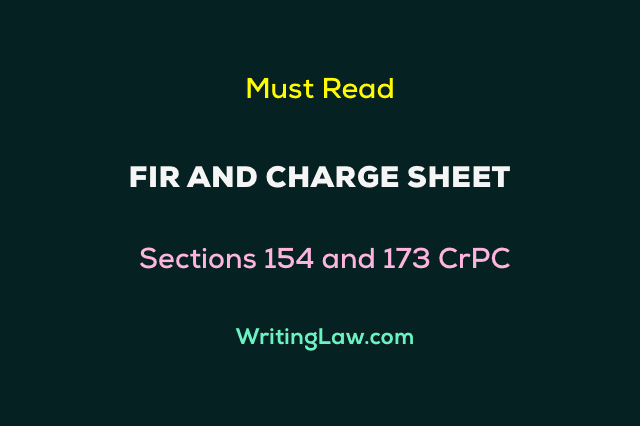
When any informant informs the police about any crime that has occurred, the police, after analysing the case is a cognizable one, registers the FIR and proceeds for investigation, arrests etc. After the investigation is over, the police submit a report to the court called a charge sheet, which forms the basis for the criminal trial.
Now that you understand the definition, let us learn more about FIR and the charge sheet under the Criminal Procedure Code, 1973.
FIR Under CrPC
According to Section 154 of CrPC, FIR stands for First Information Report given orally or in writing to a police officer. If given orally, then it must be brought down to writing by the officer in charge of the police station. It must be signed by the informant, and a copy of the FIR must be served to the same free of cost.
FIR in Cognizable Offences
According to Section 2(c) of CrPC, any offence mentioned under the Code’s First Schedule is termed a cognizable offence. Upon receiving such information, the police officer may arrest the accused without a warrant and investigate without any orders from the magistrate. It includes offences like rape, murder, dacoity etc.
Advantages of Filing FIR
The primary benefits of filing an FIR are:
- It sets out the base for investigation.
- Anyone can file an FIR.
- The chances of fabrication are less.
- Immediate filing of FIR reduces the chances of escape of the accused.
Charge Sheet Under CrPC
According to Section 173 of CrPC, a charge sheet is a report generated by police officers after investigating a case. It is submitted before the court for initiating the criminal trial.
Benefits of Charge Sheet
- It is an essential report that initiates criminal proceedings against the accused.
- Statement of the accused, as well as others, are stated.
- Charges that are framed against the accused are cited.
- It helps the accused obtain bail to some extent.
- Without a charge sheet, no criminal trial can begin.
Contents of Charge Sheet
According to section 173(2) of CrPC following shall be the contents of the charge sheet:
- Name of parties.
- Nature of information.
- Names of persons acquainted with the case.
- Whether any offence has been committed or not? If so, by whom?
- Whether the accused is arrested or not?
- Has the accused been released on bond? And if yes, surety and bond details are to be mentioned.
- Whether the accused has been forwarded to custody under section 170 of CrPC?
- Whether the medical examination report has been attached with the charge sheet if the offence is related to rape under section 376, 376A, 376B, 376C, 376D, 376E of IPC?
- The officer shall also communicate in the manner prescribed by the State Government if he has taken any action in response to the person giving FIR.
Note: After receiving the charge sheet, if the magistrate is not satisfied with the investigation, he may order further investigation under section 173(8) of CrPC.
Time Limit for Filing Charge Sheet
According to CrPC, the prescribed time limit for filing a charge sheet is as follows:
- Offence triable by Magistrate: 60 days
- Offences triable by Sessions Court: 90 days
If the charge sheet is not filed within the prescribed time mentioned above, the accused has a right to default bail.
Quashing of Charge Sheet
Several false cases are on the rise nowadays, filed to harass the accused, and some are filed out of grudge. There are provisions for the accused to come out acquitted in such situations. For this, the accused has to approach the High Court of the concerned State and file a petition under section 483 of CrPC, by which the High Court can quash the FIR/charge sheet by exercising inherent jurisdiction on the following grounds.
- When the court is satisfied that FIR is filed only to harass the accused.
- When the allegations mentioned in FIR cannot be proved.
- When the FIR is filed for a non-cognizable offence and the concerned police officer has filed the same without obtaining permission of the magistrate under section 155 of CrPC.
- When the charges against the accused are falsely reflected on the charge sheet.
Need of Quashing Charge Sheet
Devendra vs State of UP 2009 SCC 495: A civil wrong and a criminal wrong must be well distinguished. When only a civil wrong has been made out, the courts shall not allow a person to be harassed as no case of taking cognizance arises.
Wrapping up: Law is for society and against the guilty. Nowadays, police harass the accused to extort money by filing fabricated charge sheets and fake pieces of evidence in court. Courts should come out against such errant officers by punishing them. Advanced society demands smart laws, which is the need of the hour.
Read Next: Powers of Indian Police to Investigate as Per CrPC
- 10 Types or Kinds of Jurisdiction of Indian Courts - 13th April 2022
- Malicious Charge of Offence Under Section 211 of the Indian Penal Code - 17th March 2022
- About Supreme Court of India – Collegium, Powers, Judges - 7th February 2022







